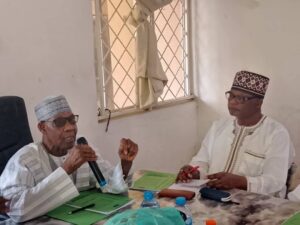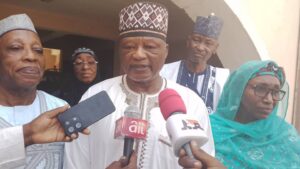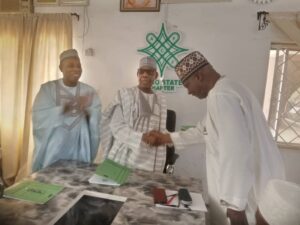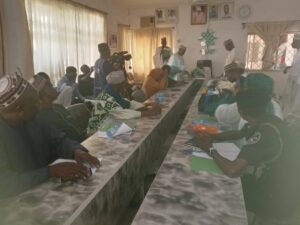Headlines
How Buhari’s associates, relatives were defeated in APC primaries

Nasiru Yusuf
In what appears the diminishing of President Muhammadu Buhari’s influence within his ruling All Progressive Congress (APC), many of his loyalists, aides, and relatives were beaten in primaries to elect the party’s candidates in the next year’s general elections.
KANO FOCUS reports that while some of them contested to be the party’s candidates in elective positions during the general elections, others sought to be rẹ-elected as the party’s representatives for positions they currently occupy.
Below is the list of Buhari’s associates and relatives who were defeated during the APC primary elections.
Sha’aban Sharada

Sha’aban Sharada is the former Personal Assistant broadcast media to President Buhari. He is also the chairman House Committee on Internal Security.
He is believed to be one of Mr Buhari’s closest allies from Kano. He has been a staunch supporter of Mr Buhari since his days in the defunct All Nigeria People’s Party (ANPP) and one of the founding members of the Congress of Progressive Change (CPC), which merged with the Action Congress of Nigeria to form the ruling All Progressives Congress.
Mr Sharada failed in his bid to become the governorship candidate of the party in Kano. He was defeated by Governor Ganduje’s anointed candidate Nasiru Gawuna by 2,289 votes to 30 votes.
In a statement sent to journalists a day after the primary, Mr Sharada said he nearly escaped assassination and that his supporters were attacked and some killed.
He called on security agencies and party leadership to “investigate and punish the perpetrators. He also asked for the nullification of the primary election saying it was marred by irregularities, vote-buying and intimidation.”
Ismaeel Ahmed
Ismaeel Ahmed is the immediate past senior special assistant to the President on social investment.
Mr Ahmed sought to be the APC candidate for Kano Central Senatorial District but stepped down just before the commencement of the primary elections due to the intervention of the governor of the state Abdullahi Ganduje.
“In the last few weeks, we ran a good campaign for the Senate of my Senatorial District in Kano. We toured all the Local Governments and interacted with delegates and party leaders and elders.
“However, yesterday I got a call from our leader and Governor, Dr Abdullahi Umar Ganduje and he asked if I could step down for some reasons, I met with my team and supporters and pored over all other considerations and knowing that in a delegate election it’s all about what the Party leadership wants, we stepped down, ” he wrote on Facebook.
Bashir Ahmad
A former new media aide to President Buhari, Bashir Ahmad, failed to secure the All Progressives Congress’ (APC) ticket to contest the House of Representative seat for Gaya/Ajingi/Albasu Federal Constituency, Kano, despite his relationship with the president.
Mr Ahmad was defeated by the incumbent member, Abdullahi Gaya, with 109 to 16 votes.
The election was conducted by the chairman of the Kano Municipal local government council Fa’izu Alfindiki, a staunch loyalist of Mr Ganduje.
Mr Ahmad had on the day of the election written on his Facebook page that he left the venue of the primary to protect his supporters because thugs were intimidating them.
“As an aspirant, I left the venue of the primary election for Gaya, Ajingi and Albasu Federal Constituency, because of the security of our majority delegates, if want to compete with the best, thugs shouldn’t be part of any election,” Mr Ahmad wrote.
The following day, Mr Ahmad in a statement rejected the result of the election and called for a fresh, free and fair election.
Sani Sha’aban
Sani Shaaban, an in-law to President Muhammadu Buhari, also lost a bid to secure the APC governorship ticket in the Kaduna state governorship primary
Mr Sha’aban came third with 20 votes only from 1,245 delegates accredited for the exercise.
Uba Sani, Nasir El-Rufai’s anointed candidate, polled 1,149 votes to clinch the governorship ticket while Bashir Abubakar, scored 37 votes.
However, Mr Sha’a ban kicked against the entire exercise, alleging that the poll was fraught with irregularities.
He alleged that the election was a ‘charade’, as most of the delegates from the 23 local governments were locked out of the voting venue and denied the right to vote for candidates of their choice.
Muftahu Muhammad
President Muhammadu Buhari’s nephew, and member representing Daura/Sandamu/Maiadua Federal Constituency, Fatuhu Muhammad, also failed in his bid to be re-elected as the party’s candidate for the Constituency.
Mr Muhammad lost the primary to Aminu Jamu who polled 117 votes to Mr Muhammad’s 30 votes.
Faruk Adamu
Faruk Ádámù is another close associate of Mr Buhari who lost the APC governorship primary in Jigawa state.
He was defeated by the deputy governor of Jigawa State, Umar Namadi, aka Danmodi, with 1,220 to 15 votes.
He was the Minority Leader in the House of Representatives between 2003 – 2007.
Mr Adamu had also failed to secure the slot of the deputy national chairman (North) of APC during the last convention.
He was said to have lost reelection due to his unflinching support to Mr Buhari.

Headlines
Governor Yusuf Signs Laws Establishing Four New Agencies in Kano

Mukhtar Yahya Usman
Kano State Governor, Alhaji Abba Kabir Yusuf, has signed into law four landmark bills that establish new agencies designed to strengthen institutional frameworks and accelerate sustainable development across the state.
The announcement was made in a statement issued on Thursday by the Governor’s spokesperson, Sunusi Bature Dawakin Tofa.
The newly signed laws provide for the establishment of the following agencies:
1. Kano State Protection Agency (KASPA)

2. Kano State Signage and
Advertisement Agency (KASIAA)
3. Kano State Information and Communication Technologies Development Agency (KASITDA)
4. Kano State Small and Medium Enterprises Development Agency (KASMEDA)
These laws, which are now part of the Kano State legal framework, are expected to stimulate innovation, support small businesses, regulate signage and advertising, and enhance public protection and service delivery.
Governor Yusuf described the signing as a significant step toward realizing his administration’s vision of a modern, inclusive, and economically vibrant Kano.
He emphasized that the new agencies will play a crucial role in job creation, investment attraction, and the efficient implementation of government initiatives.
“Our mission is to lay a solid foundation for a greater Kano. These laws go beyond policy — they are key instruments of transformation that will help drive our development agenda,” the Governor stated.
He also issued a strong warning that violations of the provisions of these laws will be met with strict penalties, reaffirming his administration’s commitment to upholding the rule of law and ensuring compliance.
The establishment of these agencies reflects Governor Yusuf’s continued efforts to reform public institutions, improve governance, and position Kano as a leading center for innovation, entrepreneurship, and sustainable growth.

Headlines
UTME: Kano suspends end of month sanitation exercise

Nasiru Yusuf Ibrahim
In a bid to ensure the smooth conduct of the ongoing Joint Admissions and Matriculation Board (JAMB) examination, the Kano State Government has temporarily suspended the April 2025, End of month sanitation exercise.
KANO FOCUS reports that this decision was taken after careful consideration and consultation with relevant stakeholders, in an effort to allow students of Kano State to write their examination without any hitches.

In a statement issued by the Director Public Enlightenment of the Ministry of Environment and Climate Change, Ismail Garba Gwammaja has quoted the Commissioner of Environment and Climate Change Dr. Dahiru M. Hashim saying that:
“The suspension is aimed at preventing any potential disruptions to the examination process and ensuring that candidates can sit for their exams without any hindrance.”
The Commissioner assured residents that the suspension is temporary for this month, and that the sanitation exercise will resume in its full force next month May 2025, in the state.
The Commissioner however, appeals to residents to cooperate with the authorities and understand the rationale behind this decision.
“We are committed to maintaining a clean and healthy environment, and we will work tirelessly to ensure that our sanitation activities do not conflict with other important events in the state,” the commissioner said.
While Commending the residents for their understanding and cooperation to the present administration, urged them to continue to avoid indiscriminate dumping of waste and cooperates with our sanitation staff to ensure clean and healthy environment always, and pray for the successful conduct of students who will sit for the Joint Admission and Matriculation Board (JAMB).

Headlines
ACF inaugurates security committee in Kano

Nasiru Yusuf Ibrahim
The Kano State Chapter of the Arewa Consultative Forum (ACF) has inaugurated a security committee aimed at strengthening community-based responses to insecurity in the state and wider northern region.
KANO FOCUS reports that the committee was inaugurated on Tuesday at the ACF Secretariat by the Chairman of the ACF Board of Trustees in Kano State, Brigadier General Haliru Akilu (Rtd), who said the initiative was a strategic response to Nigeria’s growing security challenges.


Gen. Halliru Akilu inaugurating Gen. Idris Bello Dambazau while Dr Goni Faruk Umar is watching
Akilu described the committee as a platform for strategic engagement, grassroots intervention, and policy articulation to support formal security institutions.
“This committee is envisioned to serve as a fulcrum of strategic engagement and community-driven security intervention. It symbolizes our collective resolve to restore order and peace to our communities,” he said.
He noted that the committee draws membership from various security and paramilitary agencies including the NDLEA, Police, Hisbah, Civil Defence, FRSC, NAPTIP, and vigilante groups.

Gen. Halliru Akilu delivering his address
According to him, the committee is tasked with assessing the evolving security landscape in Kano and beyond, acting as a bridge between citizens and security agencies, and developing actionable, data-driven recommendations to promote peace, vigilance and resilience across ethnic, religious, and political divides.
General Akilu stressed that the committee must operate beyond bureaucratic routines and ensure its insights influence national policy. He also urged members to demonstrate integrity, confidentiality, and dedication.
Chairman of the committee, General Idris Bello Dambazau (Rtd), pledged to uphold the mandate of the committee with seriousness and discipline.

Gen. Idris Bello Dambazau (Rtd) granting interview to journalists
“We’re bringing the seriousness of military service into this assignment. Time in service is life. One minute can cost lives. That’s how seriously we’re taking this task,” he said, adding that the committee was set to begin work immediately.
On his part, the NDLEA Commander in Kano, Ahmed Idris, commended the synergy among security agencies in the state and expressed optimism that the ACF’s initiative would serve as a model for other states.

Cross section of members of the security committee
“In Kano, we’ve built a strong culture of collaboration. This committee reflects that spirit and the quality of its membership shows the seriousness of the ACF,” he said.
KANO FOCUS reports that the initiative comes as Kano and other northern states are facing security threats such as banditry, kidnapping, drug abuse, and youth radicalization. Observers say the ACF’s grassroots-focused approach could offer a much-needed complement to conventional security responses.

Gen. Halliru Akilu (rtd) inaugurating Gen. Idris Bello Dambazau (rtd)
Speakers at the event called for similar committees to be replicated across other states in the region, with hopes that the Kano model would become a blueprint for wider regional intervention.

Members of the security committee and ACF officials
General Akilu closed the event with a call for the committee to chart a new course for peace and security in the region, describing the inauguration as “a bold first step.”














